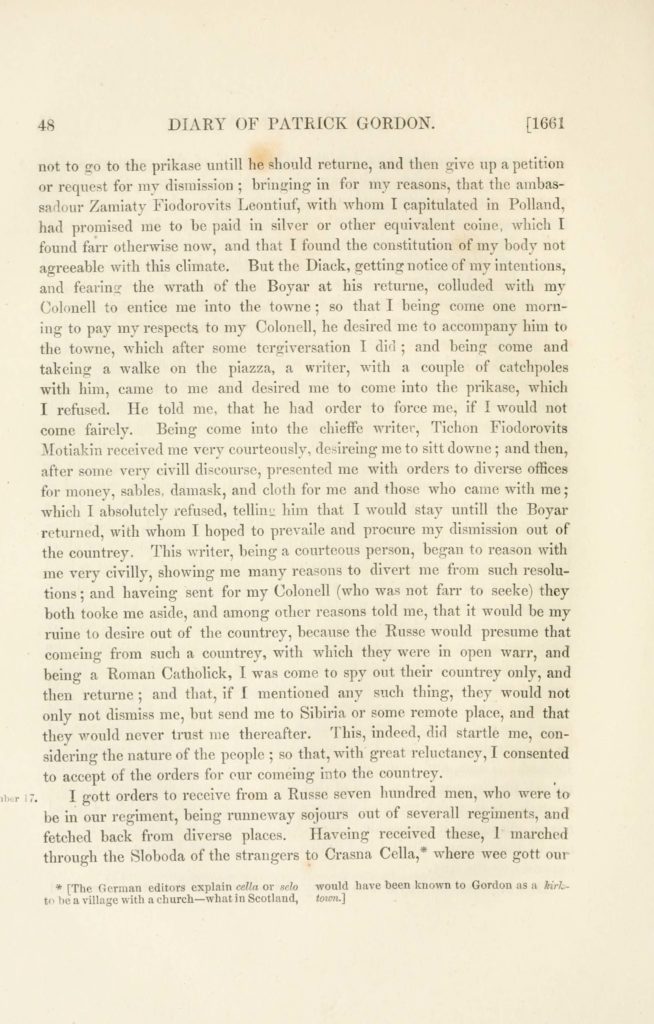
Related

46 DIARY OF PATRICK GORDON. [1661 come into the field, wee found the Boyar there before us
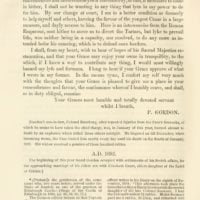
174 DIARY OF PATRICK GORDON. [1692 be restored. As for Harie Gordon
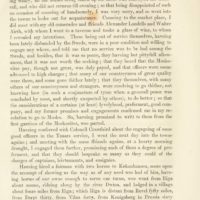
42 DIARY OF PATRICK GORDON. [1661 misfortune

170 DIARY OF PATRICK GORDON. [1690 delighted that he made the Boyars
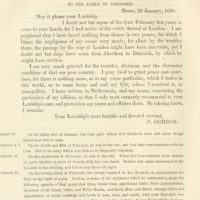
168 DIARY OF PATRICK GORDON. [1690 The twenty-eiglith of January

138 DIARY OF PATRICK GORDON. [1686 to a coachman, to bring the trunke

62 DIARY OF PATRICK GORDON. [1666 purpose to convoy
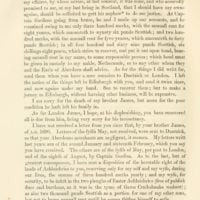
176 DIARY OF PATRICK GORDON. [1692 just wages thrive. I think he may be summoned...

172 DIARY OF PATRICK GORDON. [1690 his name was not in it, it being sent to him to be dehvered pubhkely
48 DIARY OF PATRICK GORDON. [1661 not to 20 to the prikase untill he should returne
Summary
Passages from the diary of General Patrick Gordon of Auchleuchries : A.D. 1635-A.D. 1699"
48 DIARY OF PATRICK GORDON. [1661
not to 20 to the prikase untill he should returne, and then give up a petition
or request for ray dismission ; bringing in for my reasons, that the ambas-
sadour Zamiaty Fiodorovits Leontiuf, with whom I capitulated in Polland,
had promised me to be paid in silver or other equivalent coine, which I
found farr otherwise now, and that I found the constitution of my body not
agreeable with this climate. But the Diack, getting notice of my intentions,
and fearin^r the wrath of the Boyar at his returne, colluded with my
Colouell to entice me into the towne ; so that I being come one morn-
ing to pay my respects to my Colonell, he desired me to accompany him to
the towne, which after some tergiversation I di'l ; and being come and
takeing a walke on the piazza, a writer, with a couple of catchpoles
with him, came to me and desired me to come into the prikase, which
I refused. He told me, that he had order to force me, if I would not
come fairely. Being come into the chiefFe writer, Tichon Fiodorovits
Motiakin received me very courteously, desireing me to sitt downe ; and then,
after some very civill discourse, presented me with orders to diverse offices
for money, sables, damask, and cloth for me and those who came with me ;
which I absolutely refused, tellinu him that I would stay untill the Boyar
returned, with whom I hoped to prevalle and procure my dismission out of
the countrey. This Avriter, being a courteous person, began to reason with
me very civilly, showing me many reasons to divert me from such resolu-
tions ; and haveing sent for my Colonell (who was not farr to seeke) they
both tooke me aside, and among other reasons told me, that it would be my
ruine to desire out of the countrey, because the Russe would presume that
comeing from such a countrey, with which they were in open warr, and
being a Roman Cathohck, I was come to spy out their countrey only, and
then returne ; and that, if I mentioned any such thing, they would not
only not dismiss me, but send me to Sibiria or some remote place, and that
they would never trust me thereafter. This, indeed, did startle me, con-
sidering the nature of the people ; so that, with great reluctancy, I consented
to accept of the orders for our comeing into the countrey.
I gott orders to receive from a Russe seven hundred men, who were to
be in our regiment, being runneway sojours out of severall regiments, and
fetched back from diverse places. Haveing received these, 1 marched
through the Sloboda of the strangers to Crasna Cella,* where wee gott our
* [The German editors explain cella or sclo would have been known to Gordon as a Url^
to be a village with a church— what in Scotland, town.]
Gordon was brought up and remained a lifelong Roman Catholic, at a time when the Church was being persecuted in Scotland. At age of fifteen, he entered the Jesuit college at Braunsberg, East Prussia, then part of Poland. In 1661, after many years experiences as a soldier of fortune, he joined the Russian army under Tsar Aleksei I, and in 1665 was sent on a special mission to England. After his return, he distinguished himself in several wars against the Turks and Tatars in southern Russia. In recognition of his service he was promoted to major-general in 1678, was appointed to the high command at Kiev in 1679, and in 1683 was made lieutenant-general. In 1687 and 1689 he took part in expeditions against the Tatars in the Crimea, being made a full general. Later in 1689, a revolution broke out in Moscow, and with the troops under his command, Gordon virtually decided events in favor of Peter the Great against the Regent, Tsarevna Sophia Alekseyevna. Consequently, he was for the remainder of his life in high favor with the Tsar, who confided to him the command of his capital during his absence from Russia. In 1696, Gordon's design of a "moveable rampart" played a key role in helping the Russians take Azov. One of Gordon's convinced the Tsars to establish the first Roman Catholic church and school in Muscovy, of which he remained the main benefactor and headed the Catholic community in Russia until his death. For his services his second son James, brigadier of the Russian army, was created Count of the Holy Roman Empire in 1701. At the end of his life the Tsar, who had visited Gordon frequently during his illness, was with him when he died, and with his own hands closed his eyes. General Gordon left behind him a uniquely detailed diary of his life and times, written in English. This is preserved in manuscript in the Russian State Military Archive in Moscow. Passages from the Diary of General Patrick Gordon of Auchleuchries (1635–1699) was printed, under the editorship of Joseph Robertson, for the Spalding Club, at Aberdeen, Scotland, 1859.
